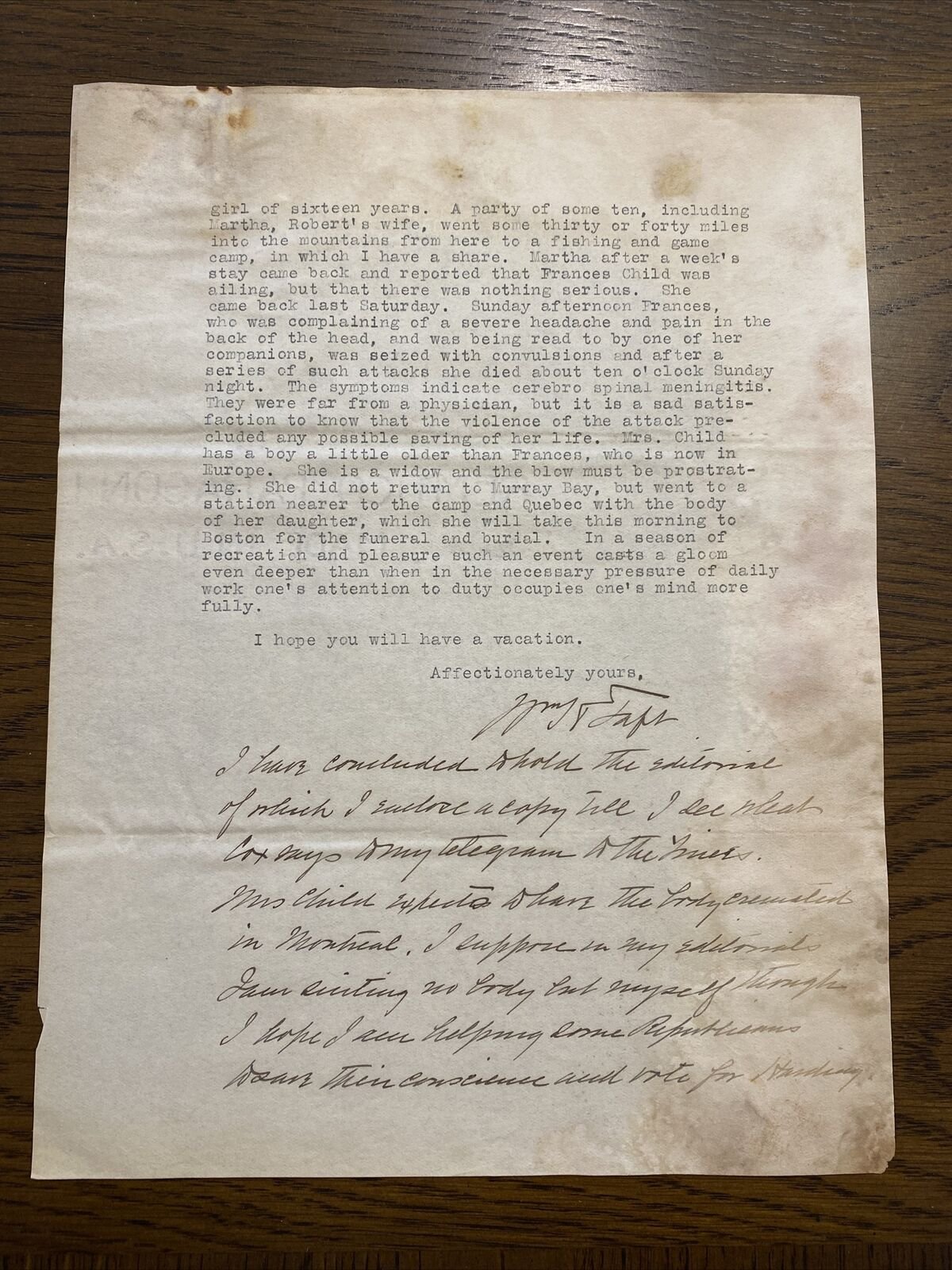William H. Taft 1920 Typed Letter Signed – Supporting the League of Nations and President Harding
27th President. Three-page typed letter signed (TLS) “Wm H. Taft”, August 10, 1920, personal stationery from New Haven, Connecticut [but Taft was in Point-a-Pic, Canada], 8×11, to Gus Karger at the Post Building in Washington, D.C., discussing a wide variety of topics focusing on Warren Harding’s 1920 campaign, in part:
…I am carrying on a difficult discussion and maintaining an attitude which I expect to continue through the campaign. I believe thoroughly that I am right. If there were more doubt of it in my mind than there is, I would still feel the necessity of taking the position because I am confident of Harding’s election and I am anxious to prevent a slump from him of League Republicans, whose defection might weaken his obligation to secure a modified League in some form, which the Republican platform and his acceptance speech impose upon him.
In your previous letter you quoted from Harding’s letter to you language that indicated that he had not departed from the principle of his two votes for the league with reservations, but that he was only engaged in trying to hold the two elements of the party together by an indefinite statement, which each might construe for itself.
I have had a visit from Irving Fisher, an intimate friend of mine, with whom I often differ. He had had a personal conversation with Harding for the purpose of finding out what he would do in respect to the League of Nations. He had a similar talk with Cox…
Cox thinks he can put me in a hole by pressing me as to my Senatorial preferences. The New York Times telegraphed me his statement on the subject and I answered it, as you may have seen. I have amplified this some in an editorial in the Ledger which I am forwarding today and of which inclose you a copy. It leaves my vote on the Senatorship in Connecticut on the question whether the Democratic opponent is a Wilson and Cox Bitter Ender as to Article Ten or not. Homer Cummings was a candidate in the previous election and I presume he may be again. If so he is surely a bitter ender.
…The use of Welliver by Harding is part of his program of propitiating the Progressives. I agree with you exactly in your criticism of Harding’s present campaign. He devotes no time to the great issues of a domestic character, for which he is going to receive most of his votes, and with which he will secure those whom he has made lukewarm by his ‘fogging’ in respect to the League and his evident grudging attitude toward it.
Taft concludes the letter discussing some family matters as he was pleased to become a grandfather for the 4th time and recants a story of a young child passing away after going on an excursion “some thirty or forty miles into the mountains from here to a fishing and game camp.”
After signing the letter, Taft adds a lengthy handwritten postscript:
I have concluded to hold the editorial of which I enclose a copy till I see what Cox says to my telegram to the Times…I suppose in my editorials I am suiting no body but myself though I hope I am helping some Republicans to save their conscience and vote for Harding.
Harding would defeat James Cox in the 1920 election and he would nominate Taft for Chief Justice of the Supreme Court less than a year after this letter was written.
Gus Karger was the press chief of William Howard Taft’s 1908 presidential campaign and director of the Republican Party’s press bureau in the 1912 presidential election.
The letter has scattered staining, edge chipping, and rippling from onetime exposure to moisture. Very good condition, content still clearly legible.
Most of the Karger collection is heavily damaged – this letter less so and filled with superior content.
Sold with the aforementioned four-page editorial rough draft, which bears numerous emendations in Taft’s own hand, as well as a carbon of Karger’s letter from August 18, 1920.




